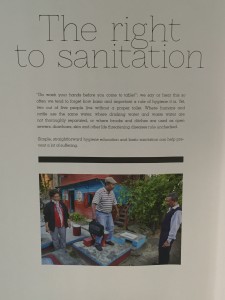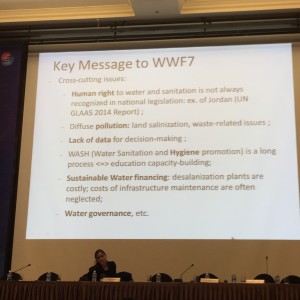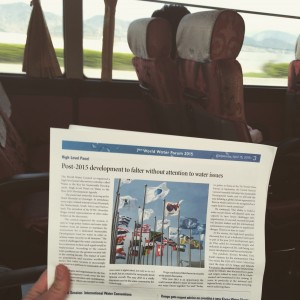Event Summary: Daegu (and Gyeongju) Day 3 – Unifying our WASH vocabulary and investing in hygiene
April 15, 2015
This blog is the third in a series of daily updates on handwashing at the World Water Forum 7 happening this week in South Korea. Our PPPHW Deputy Secretariat Director, Hanna Woodburn reports from Daegu. 
Those who are following the World Water Forum closely will know that there are events occurring in two locations. Prior to today, I only attended sessions in Daegu. However, with the regional sessions occurring in Gyeongju, I split my day between the two locations.
The first session I attended in Daegu explored indicators and governance. While the content of this event was heavily geared toward the water sector, there were takeaways for hygiene. One comment that I found to be particularly relevant was that a challenge often found with indicators can be a lack of unifying vocabulary outside of regions, sectors, and contexts.
Certainly this was a challenge we encountered and addressed during development of the Joint Monitoring Programme’s proposals for the Sustainable Development Goals, targets, and indicators. Ultimately, in this context, hygiene was explicitly defined to include menstrual hygiene management and handwashing with soap, but of course a broader definition of hygiene may include behaviors from facewashing to food hygiene. Outside of the sector, the definition of hygiene becomes ever less clear. For instance, as this art exhibit shows, even at the World Water Forum sometimes when people say sanitation they actually mean hygiene!
In Gyeongju I sat in on an event hosted by Global Water Partnership Central Africa exploring the current status and future prospects of safe water and integrated sanitation for all in the region. I have been particularly interested in the Africa regional sessions this week as the PPPHW prepares to host two events at AfricaSan next month. As with yesterday’s session on the human right to water and sanitation in Africa, the energy and debate at this session did not disappoint.
During the two hours, there was much discussion about the role of youth, challenges around financing, and sustainability—topics that have been common refrains throughout the World Water Forum as a whole. During the audience discussion I made the following points, which also hold wider significance.
First, when we discuss monitoring, either in the national context or as it pertains to global level Sustainable Development Goals, we must ensure that hygiene is included.
Secondly, there has been much discussion about funding challenges for WASH. As I mentioned in the Africa regional session, we know that hygiene is a worthwhile investment. It’s the most cost-effective intervention against diarrheal disease and the return it provides in terms of health, education, and economic benefits make it a smart financial investment. The GLASS report released in 2014 supports this conclusion – the report identifies the lack of investment in hygiene as a serious barrier to progress in international development. I was pleased to see the Mediterranean regional group include this argument in their report of recommendations to the World Water Forum.
Finally, investment in hardware solutions (taps and toilets) is not sufficient to encourage behavior change. The introduction of a new water supply to a community is a perfect opportunity to raise the issue of hygiene. Although most sanitation and water supply program implementers seek to improve hygiene alongside hardware, they rarely have the resources and professional support needed to do this effectively. Large-scale engineering programs are rarely equipped to handle what they call the so-called “software” or behavioral side of development. To address this we must better integrate approaches to sanitation programs to fully reap the potential benefits.
As a panelist said today, “In Africa, we are all cousins. We face the same problems and we have the same potential.” I think that the same could be said of the WASH sector. I look forward to delving into those areas of challenges and opportunities some more tomorrow at the last full day of the World Water Forum 7.


